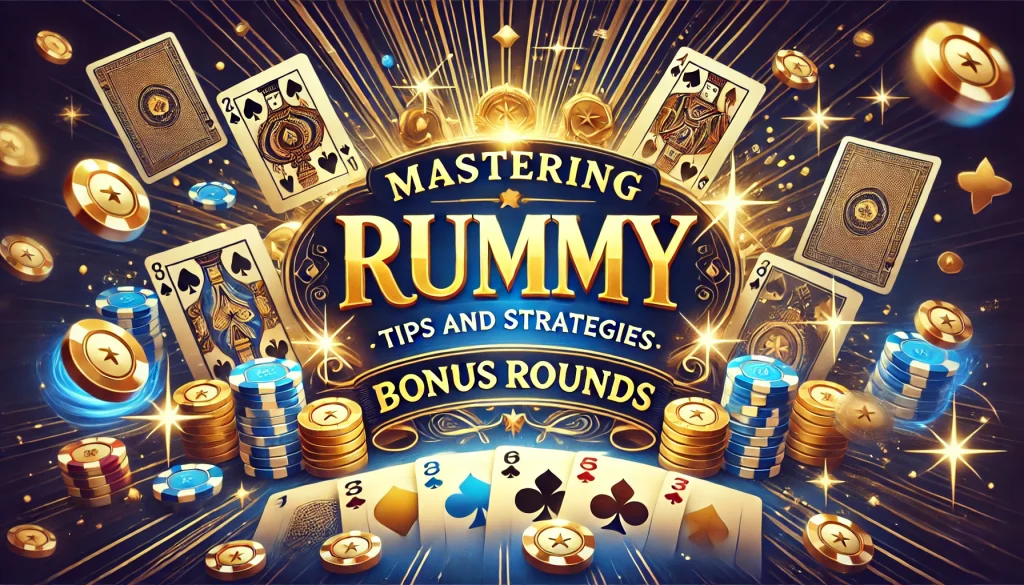Description

Rummy: The Ultimate Guide to the Bonus Round Rummy is a card game that has captured the attention of players worldwide with its combination of skill, strategy, & a little bit of luck. The Bonus Round, which can have a big impact on the game’s outcome, is one of the most thrilling parts of Rummy. For players looking to improve their gameplay and raise their scores, it is essential to comprehend the nuances of this round. A player can earn extra points based on certain requirements during the Bonus Round, which usually happens after they have successfully melded their cards. A player’s ability to create melds is put to the test in this phase, which also forces them to consider their discards and joker usage strategically.
Players can use a variety of strategies to build sets and sequences, make good use of jokers, & control their discards to earn points during the Bonus Round. The potential for high scores, which have the ability to quickly change the outcome of the match, is what makes this round so exciting. But in order to take full advantage of the opportunities, one must also have a thorough understanding of the scoring system and the rules. Players must be alert & flexible as they move through this round because the dynamics can change quickly depending on what their opponents do.
A player’s chances of winning in rummy can be made or broken during the crucial Bonus Round. After players lay down their cards in valid combinations during the first melding phase, this round usually follows. After successfully melding, a player advances to the Bonus Round, where they can earn more points by meeting certain requirements. The rules that apply to this round can change based on the type of rummy being played, but in general, players receive rewards for using their cards to form sets and sequences.
In this stage, players need to play their cards strategically. Anticipating your opponents’ moves is just as important as finishing your own melds. It is crucial to comprehend the scoring system; for example, some combinations may result in more points than others. As the round draws to a close, players also need to be mindful of how many cards they still have in their hands because this can affect their final score. In order to maximize points in the Bonus Round, careful planning and foresight are necessary; luck is not enough.
Comprehending the Rummy Bonus Round. Players need to develop a strategic mindset that centers on maximizing their points if they want to succeed in the Bonus Round of Rummy. Making the formation of high-value melds a top priority early in the round is one useful strategy. Players can establish a strong basis for their score by laying down sets or sequences that contain high-ranking cards.
Analyzing opponents and strategic melting. For instance, you can greatly increase your total points by melding a sequence that contains aces or face cards. Players should also watch what their opponents discard because this can reveal important information about the cards they may be holding & the melds they are attempting to form. By using this information, you can decide which cards to keep & which to throw away. Good Hand Control.
Since unmelded cards will be deducted from a player’s score at the end of the round, players should try to hold as few of these as possible. Choosing which cards to keep and which to discard requires strategy. Try to get rid of cards early on to avoid penalties later if you see that they aren’t helping with your melds. Making Use of Jokes to Improve Score.
Jokers can also be used as wild cards in melds and can help finish sets or sequences that would otherwise be challenging to complete, so using them effectively can increase your chances of scoring. It takes both strategic foresight and deft card management to build melds during the Bonus Round. Focusing on producing sequences first is a good tactic because they frequently score higher than sets.
It is crucial to maintain track of which cards have been played and which are still available because a sequence is made up of three or more consecutive cards of the same suit. As they draw new cards from the deck or take cards from the discard pile, players can generate opportunities for more melds by giving priority to certain sequences. The possibility of forming sets—three or four cards of the same rank but different suits—should be taken into account by players in addition to sequences.
Sets can still make a big difference in your final score even though they might not always result in as many points as sequences. Flexibility and adaptability during gameplay can be achieved by using a balanced strategy that combines both kinds of melds. Also, you can stay competitive throughout the Bonus Round by anticipating your opponents’ moves and modifying your own accordingly. Discards are important in rummy, particularly when every card counts toward your final score during the Bonus Round. Observing what your opponents are discarding is a good tactic because it can give you important information about their hands & assist you in choosing your own discards.
Hold onto similar cards that might upset your opponent’s plan, for example, if they discard a card you know they need for a meld. Also, strategically using your own discards can limit your opponents’ options while opening up opportunities for you. Understanding Sequences & Sets. A sequence consists of three or more consecutive cards of the same suit, such as 4-5-6 of hearts.
On the other hand, a set comprises three or four cards of the same rank but different suits, like three kings. Building a Balanced Hand. Both sequences and sets contribute significantly to a player’s overall score & should be prioritized accordingly. Players should aim to create a balanced mix of sequences and sets during the Bonus Round.
While sequences often yield higher points due to their consecutive nature, sets can also provide valuable scoring opportunities when formed correctly. Adapting to Changing Circumstances. Being aware of which cards are still available in play can help players make informed decisions about which melds to pursue.
By focusing on both sequences and sets while remaining adaptable to changing circumstances during gameplay, players can enhance their chances of success in this critical phase. Calculating your score during the Bonus Round is an essential skill that every Rummy player should master. The scoring system typically assigns different point values based on the types of melds formed and any remaining unmelded cards in hand at the end of the round. For instance, sequences may carry higher point values than sets or individual cards left unmelded.
Understanding these values allows players to make informed decisions about which melds to prioritize & how best to manage their hands. To accurately calculate your score at the end of the Bonus Round, begin by tallying up points from all completed melds—both sequences & sets—while factoring in any jokers used within those melds. Next, subtract points for any unmelded cards remaining in your hand; these penalties can significantly impact your final score if not managed properly throughout gameplay. By developing a clear understanding of how scoring works during this round, players can enhance their strategic approach & ultimately improve their chances of winning.
As with any game, there are common pitfalls that players should be aware of when navigating through the Bonus Round in Rummy. One frequent mistake is failing to prioritize high-value melds early on; by neglecting these opportunities, players may find themselves at a disadvantage as they approach the end of the round with limited scoring potential. It’s essential to remain proactive about forming sequences and sets rather than waiting until later stages when options may become limited. Another common error involves mismanaging discards; players often underestimate how much information they reveal through their discards or fail to consider how those discards may impact their opponents’ strategies. Discarding valuable cards too early or holding onto unmelded cards for too long can lead to missed opportunities for scoring or increased penalties at round’s end.
By being mindful of these common mistakes and adopting a more strategic approach during the Bonus Round, players can significantly enhance their overall performance and increase their chances of victory. In conclusion, mastering the Bonus Round in Rummy requires a combination of strategic thinking, careful planning, and adaptability. By understanding how to maximize points through effective melding strategies and smart discard management while recognizing key elements like jokers and scoring systems, players can elevate their gameplay significantly. Avoiding common mistakes will further enhance one’s chances for success in this exciting phase of Rummy—ultimately leading to more enjoyable and rewarding gaming experiences.
If you have completed a meld but still have excess cards that do not contribute to your score, consider discarding them in a way that makes it difficult for your opponents to form their own melds. This tactic not only helps you manage your hand effectively but also puts pressure on your opponents as they navigate through their own card combinations. Ultimately, being mindful of discards can significantly enhance your chances of success during the Bonus Round. The joker is often considered one of the most powerful cards in Rummy, especially during the Bonus Round where its versatility can greatly influence gameplay. As a wild card, a joker can substitute for any card in a meld, making it an invaluable asset when trying to complete sequences or sets.
Players should prioritize using jokers strategically; for instance, if you find yourself one card short of completing a high-value sequence, using a joker can help you achieve that goal and maximize your score. However, it’s essential to recognize that while jokers are powerful tools, they should be used judiciously. Over-reliance on jokers can lead to missed opportunities for forming natural melds with actual cards from your hand. Also, keeping track of how many jokers have been played can provide insights into what melds your opponents may be trying to form. By understanding both the strengths and limitations of jokers in the Bonus Round, players can leverage this card effectively to enhance their overall strategy.
Rummy is a game that revolves around building sequences and sets, which are essential components of a player’s hand and scoring system. Understanding how to create these combinations effectively is crucial for maximizing scores during the Bonus Round.

